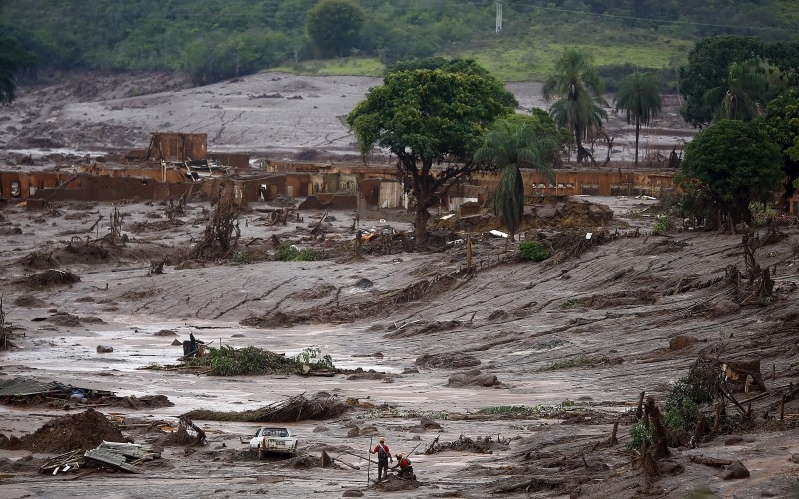
A river of mud from burst dams at a Brazilian iron ore mine forced populous cities more than 300 km (200 miles) downstream to cut off drinking water on Monday, raising health and environmental concerns as slow-moving search efforts continued.
Twenty-five people are still missing after one of the worst mining disasters in Brazil's history. Officials confirmed two deaths since Thursday's tragedy and are working to identify two more bodies recovered on Sunday.
Exhausted search teams waded through waist-deep mud as thick as wet concrete among the tangled remains of Bento Rodrigues, the village most devastated by the mudslides. The 600-person community stood in the shadow of the broken dams, located about a six-hour car ride north of Rio de Janeiro, in the heart of Brazil's iron ore belt.
Intense flooding swept through towns as far as 100 km (62 miles) away after the dams burst at two reservoirs holding mining waste. Four days later, the contaminated mud is still running past the well-populated banks of the Rio Doce river.
Governador Valadares, a city of 280,000, cut off its municipal water supply for over 24 hours and will keep testing the water until the mud passes, officials said on Monday.
Health authorities are checking the toxicity of the waters and told residents who came in contact with the mud to throw out their clothing. Biologists warn that the environmental impact may be permanent, devastating local fisheries and farms.
Residents and officials have also criticized what they say has been lax communication by mine operator Samarco, a joint venture between the world's largest mining company, BHP Billiton Ltd, and the biggest iron ore miner, Vale SA.
The mayor of nearby Mariana, Duarte Junior, said Monday that both BHP and Vale need to take responsibility for relief efforts, not just Samarco.
BHP said Andrew Mackenzie, chief executive officer of the Australian company, would visit Brazil early in the week to assess the situation.
Vale CEO Murilo Ferreira visited Mariana on Saturday, but did not speak with reporters. The Brazilian company has offered helicopters and other equipment for the rescue effort, according to a press statement.
SUSPENDED LICENSE
Officials have not determined the cause of the disaster, but a public prosecutor says a 2013 study showed flaws in the design of one of the dams. Workers were enlarging the dam when it burst, unleashing some 55 million cubic meters of waste water.
The tragedy has galvanized government officials, environmentalists and outraged residents to call for tighter regulation of the powerful mining industry.
"Now is the time for a national debate about what we want from mining, and at what cost," said Antonio Carlos de Oliveira, a state prosecutor weighing the environmental impact of the disaster. He and other prosecutors will meet on Wednesday to discuss their next steps, he said.
Samarco mines a tenth of Brazil's iron ore exports and accounts for about a fifth of the international trade of pellets, used for making steel.
Cleanup costs and potential lawsuits could be more costly than the loss of output. The financial toll comes at a particularly bad time for BHP and Vale, with iron ore prices at their lowest in a decade and one quarter of their 2011 level.
Samarco has said it is dedicated to mitigating the environmental and human impact of the disaster, paying for accommodations and relocation of affected residents.
State environmental authorities confirmed on Monday the suspension of Samarco's mining license until it takes a series of safety measures.
Families complain that the company has given few answers about how long the displacements might last or how they might eventually repair or replace damaged homes.
Hope is wearing thin for Marcelo Jose Felicio, a contractor at the mine with a tattoo of his mother, who went missing from Bento Rodrigues when the village was consumed by mud.
"No one tells me anything," he said. "I don't know if she is alive. I don't even know if she is on the list of the missing. I've passed around photos in case someone finds her."
In spite of the despair, the Mariana mayor defended the importance of mining to his city, which gets 80 percent of public revenue from the industry.
"Mariana survives on mining," Junior said. "We can't make it inviable."
Vale told Reuters on Monday that the mudslides had knocked out a conveyor belt and would affect output at its own nearby mining operation. Vale produced nearly 39 million tonnes of iron ore at its Mariana complex last year and output was up 1 percent in the first nine months of 2015.






